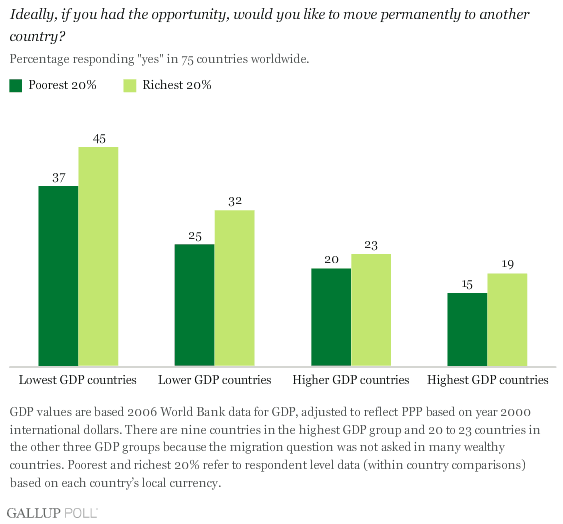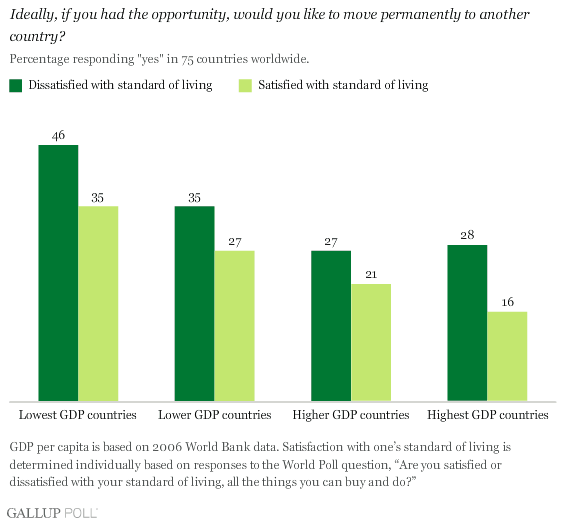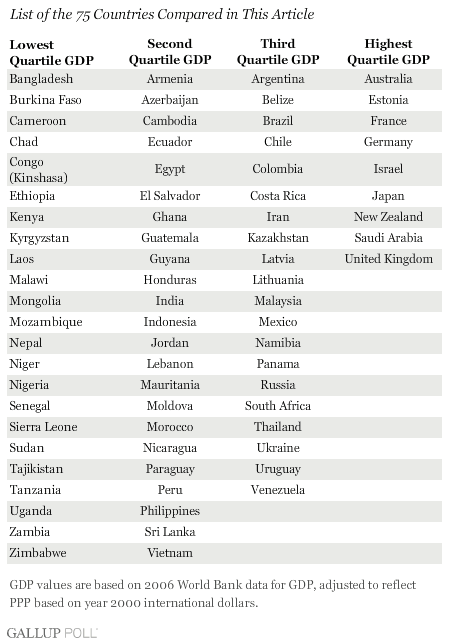WASHINGTON, D.C. -- Gallup Polls show that in rich and poor countries across the world, it is richer rather than poorer individuals who express more interest in migration.

This does not mean that Bill Gates and Warren Buffet are packing their bags to move abroad. Although richer people may be more likely to express a desire to migrate within a given country, the reported desire to migrate is also higher in poorer countries as compared with richer countries. In countries that are at the bottom quartile in GDP worldwide, desired migration rates are about twice as high as they are in countries in the top quartile in GDP. However, for countries at every level of GDP, it is generally those individuals who are richer rather than poorer (by the standards of their own countries) who are more likely to say they wish to migrate. This association between personal wealth and the desire to migrate is stronger in countries with lower GDPs as compared with countries with higher GDPs. In the world's poorest countries, there is an eight-percentage-point gap in migration desire between the richest 20% and the poorest 20% of the population. In the world's richest countries, this difference is only four points.
This difference between country-level and individual-level results may help explain the persistence of the idea that personal poverty fuels migration. According to the Migration and Remittances Factbook 2008, immigrants tend to flow from poor to wealthy countries. For this reason, many people assume that it is the poor rather than the rich people in these poor countries who wish to migrate. Gallup Poll data clearly reveal that this is not the case.
People may also assume that personal poverty fuels migration because they confuse economic dissatisfaction with economic deprivation. In poor and wealthy countries, the Gallup Polls show that people who say they are dissatisfied with their standard of living are more likely than those who say they are satisfied with their standard of living to report that they would like to migrate. However, dissatisfaction with one's standard of living is not the same as poverty. In fact, statistical analyses of personal income and satisfaction with one's standard of living revealed that each of these variables was uniquely associated with the reported desire to migrate. Within a given country, it is those who are wealthy and dissatisfied with their standard of living who are more likely to report that they wish to migrate.

In hindsight, it makes sense that poor people might not express interest in migration. Poor people may have limited exposure to information that would foster a desire to migrate, including basic information about other countries. In these same Gallup Poll data, for example, only 25% of the poorest people in the world's poorest countries report that they have a television in their homes. In these same poor countries, TV ownership climbs to almost 69% among those in the wealthiest group. Moreover, even if poor people do encounter information about other countries, as they certainly do when they live in countries with higher GDPs, it may be difficult for people to imagine doing what has never really seemed possible for them.
Because these findings are inconsistent with many people's assumptions about personal income and migration, it is useful to ask whether the reported desire to migrate translates into actual migration. Answering this question will require additional polling and additional analyses. However, that our analysis of personal income is consistent with known migration patterns based on education level suggests that there is some validity to people's reported desire to migrate.
Policy Implications
If we take into account that wealthier people tend to be more educated, these findings may speak to the problem of "brain drain" that plagues many poor countries. In some poor countries, the majority of those who earn a college degree may eventually leave their home country. For instance, according to the Migration and Remittances Factbook 2008, the emigration rate among college graduates in Belize is 51%. In Guyana, Jamaica, and Haiti this figure exceeds 80%. This may be good news for the countries to which such educated people move, but it is bad news for the countries these educated citizens are leaving. In wealthy and rich countries worldwide, leaders and policy-makers who wish to address the problems and opportunities posed by migration will need to better understand those who wish to migrate. Gallup Polls show that those who wish to migrate may be better off financially than many people assume.
Survey Methods
Results are based on telephone and face-to-face interviews conducted in 2007 with approximately 1,000 adults per country. For results involving personal income, confidence intervals were +3 percentage points. For results involving satisfaction with standard of living confidence intervals were +2 percentage points because of larger sample sizes. In addition to sampling error, question wording and practical difficulties in conducting surveys can introduce error or bias into the findings of public opinion polls.

